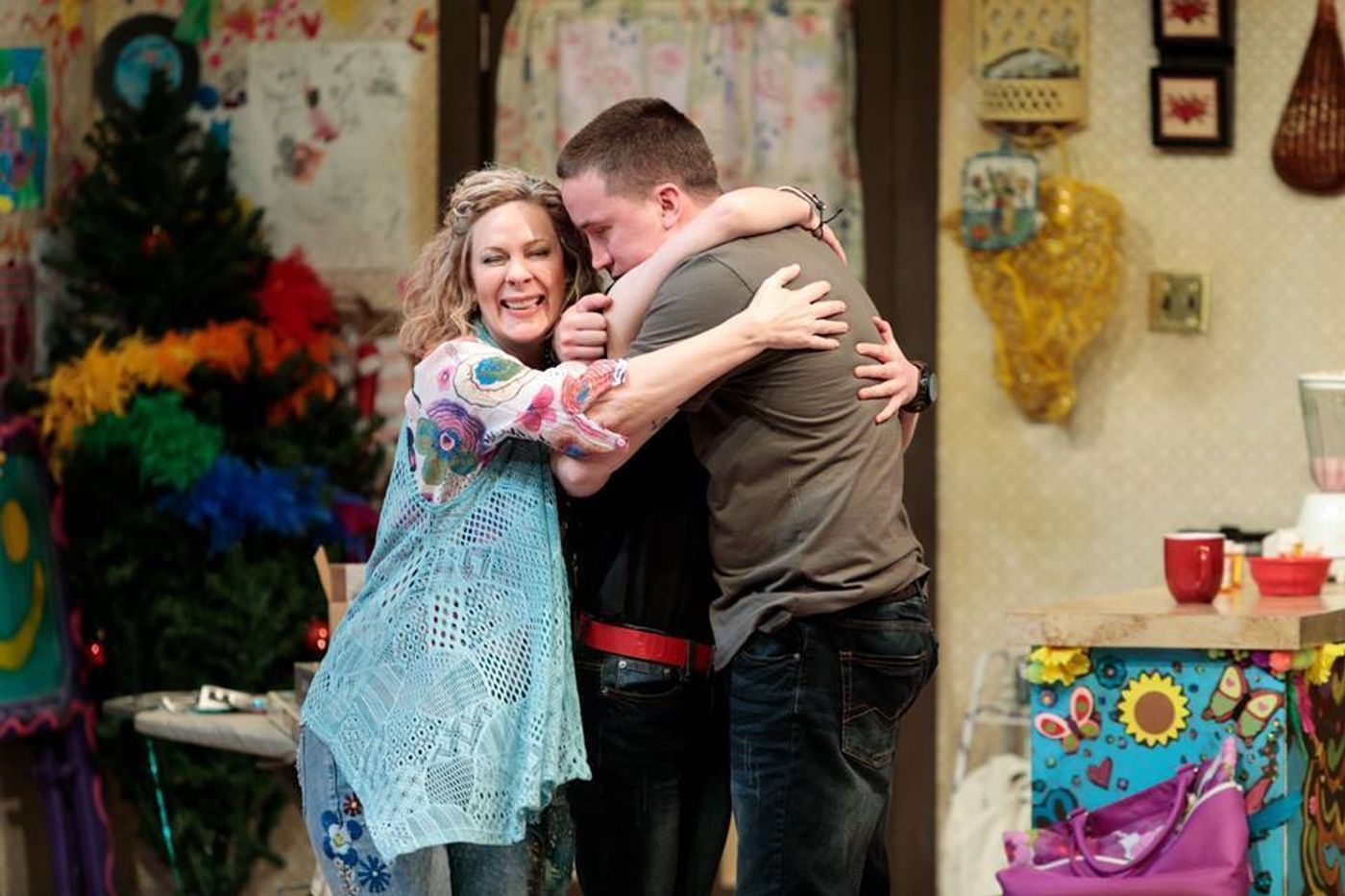Review: HIR at Salt Lake Acting Company

The title of the Salt Lake Acting Company mainstage production needs explanation. It is HIR, which is also a newly devised third-person singular, gender-neutral personal pronoun for a man or woman transitioning to the opposite sex. It combines him and her.
Pronounce it as "here" -- but it's not to be confused with a nearby location, a running gag of the show. (Ze is to be used in place of he and she.)
Hir is also the preferred pronoun of the play's protagonist, Max, who has been known as Maxine.
"Max!" yells Paige, hir's mother. "Come out here and explain your gender ambiguity to your brother."
Max's brother Isaac opens the door upon his return home after three years and is beyond mystified: "This place is a f-ing disaster."
To explain the premise of the four-character piece, Isaac is returning from military service. "Domestic adversity," according to Paige, shouldn't be discussed while servicemen are deployed oversea.
It's not just the transition of his sibling that has Isaac shocked. The house resembles depictions of the A&E reality series "Hoarders," including Isaac not being able to use the front door and dayglow drawings on walls and furniture . Along with Max's revelation, Isaac's father Arnold has had a stroke, rendering him handicapped -- nearly incoherent, mostly nonverbal and physically debilitated.
Also, the formerly abusive Arnold is dressed as a woman, force-fed blender-fresh pink-colored "shakey-shakes" -- with estrogen, prescribed medications and assorted chemical cocktails. And he has white-faced clown makeup and a dime-store rainbow afro wig. To complete Arnold's abuse, Paige squirts him with water as if he were a pesky pet when she considers him misbehaving.
Paige's outlook on life has completely changed, although her "paradigm shift" doesn't seem to alarm Isaac.
SLAC's production of HIR is highly professional and top-notch, with three splendid performances under Tracy Callahan's spirited, superb direction. The black comedy is great fun and deeply appreciated.
Along with the storyline, it would also help theatergoers to have an understanding of absurdist realism style of the HIR playwright, Taylor Mac. An acclaimed deconstructive performance artist (for the Obie-winning "The Lily's Revenge"), Mac was a Pulitzer Prize finalist for "A 24-Decade History of Popular Music," a 24-hour-long production. Turning to Wikipedia to research the author, we learn of resisting "categorization by the press: After being described as Ziggy Stardust meets Tiny Tim, Mac created 'Comparison Is Violence, or the Ziggy Stardust Meets Tiny Tim Songbook.'" His preferred gender pronoun is "judy" (lowercase).
It's deeply satisfying to see the playwright's intent fully realized in this staging, without diluting for Salt Lake audiences. The company admirably continues its dedication to fearless and adventurous new plays. And HIR is fearless and adventurous.
Yet the play is deeply challenging, by design. Perhaps due to its startling combination of absurdism and realism. Might Isaac's frequent vomiting into the kitchen sink reference conservative theatergoers' anticipated reaction of the playwright's radical stance?
But the problem I had with HIR, after the fantastical fish-out-of-water premise established in the first act, is the play goes nowhere. Act 2 meanders, with no dramatic tension at intermission to anticipate a second act. Then HIR is pointless, other than to humorously tweak transgenderism and indicate continuing spousal abuse. (But why is Arnold's violence toward his family only mentioned by Paige?) Act 2 needs an enhancing Reason to Be, or raison d'être for the studious.
We do humorously learn that Noah was transphobic when selecting animals for the Ark. "Did he invite the snakes that don't care about their gender and procreate by having massive snake orgies?" And the room temperature is altered with arguments whether the air conditioning should be on or off. The model for the Mona Lisa is again speculated.
The audience is left wondering that if HIR were written from a different perspective -- to embrace Isaac's warm acceptance of Max's new role and the sympathy he feels toward Arnold -- the play would have been more rewarding while still subversive, and gleefully insubordinate, absurdism.
Austin Archer is brilliant as the bewildered vet, continuing his impressive list of varied performances that includes twelve roles at SLAC and massively different characters in Pioneer Theatre Company's "Newsies," "A Few Good Men" and "Spelling Bee," to name three.
The powerhouse Christy Summerhays is dazzling as Paige as she walks the thin line between monster and mother, while being self-aware of the two sides of the coin. We simultaneously love her and hate her. But it's painful to watch Paige's over-the-top horrific and dehumanizing debasement Arnold casually endures, perhaps because the role is so richly played by veteran actor Richard Scott.
Liggera Edmonds-Allen's tongue-twisting lines -- "joining a radical fairy commune where they have gender queers who have actual discourse and ideas and where they grow their own food and recycle and have heart circles and sexual freedom" -- are largely clear. With only one previous stage role, the inexperience and stunt casting saps energy opposite the other actors' excellence.
Credit Cara Pomeroy for the set whimsy and Spencer Potter for the serviceable costumes.
HIR is strives to be an audacious redefinition of mainstream theater programming. Audiences should come prepared to appreciate the production. Recognize the playwright's design and enjoy a fun night of theater.
Both SLAC and the playwright know that HIR will not be everyone's cup of tea. But it might just be an energizing shakey-shake.
Reader Reviews

Videos

